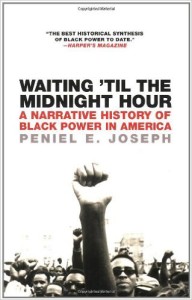Retro Book Club: Waiting ‘Til the Midnight Hour
 If one cannot enjoy reading a book over and over again, there is no use in reading it at all. – Oscar Wilde
If one cannot enjoy reading a book over and over again, there is no use in reading it at all. – Oscar Wilde
I want to start a new feature here where I not only discuss new books, but also not so new books. The point of this is to revisit older, classic books and look at their context through today’s political, social and cultural perspective. Sometimes when you reread a book you come away with different insight.
The first book in this series is Peniel Joseph’s 2007 book Waiting ‘Til the Midnight Hour: A Narrative History of Black Power in America, which is a chronology of black radical movers and shakers, such as Malcolm X, Stokely Carmichael, Amiri Baraka, the Nation of Islam, the Black Panthers, amongst many others. When I first read this book nine years ago, America was in a different place racially. Barack Obama wasn’t president yet and the Black Lives Matter movement hadn’t begun.
I was inspired to reread this book because I recently attended a cocktail reception for young entrepreneurs of color, where I had a colorful conversation with an older black man named Morris about the role of black radicals in social movements of yesterday and today. We started talking about the new Jackie Robinson documentary and his civil right work. Like I said a few weeks ago, the baseball legend became a Republican activist, and even campaigned for Richard Nixon and Nelson Rockefeller. There is a part in the documentary where Robinson feuded with other black nationalists of that time who thought he was an “Uncle Tom.”
“Jackie Robinson and Martin Luther King are the true black leaders we should be looking up to today, not the Panthers,” Morris said.
Morris told me that he lived through the civil rights movement in Georgia and has always been a supporter of non-violent activism. He also said that the Black Lives Matter movement would be better off taking lessons from the southern civil rights movement than from the black power movement.
After rereading the book, I came to the realization that both movements continue to be valuable for supporting civil rights objectives today. The book does a good job of not only highlighting the well-known players, but also lesser known, but equally important figures, like maverick journalist William Worthy, who openly defied the U.S. State Department by traveling to Cuba and China, and Jimmy and Grace Lee Boggs, an interracial couple that used their Detroit home to organize other local black radicals.
I also enjoyed the discussion in the book about connecting American racism and other social justice and anti-colonial movements throughout the Third World. Sometimes we forget that racism isn’t just an American problem, and many black power activists joined forces with other international activists.
While it wasn’t discussed a lot in the book, I really appreciated the discussion about the role of women in the black power movement, most notably Katharine Cleaver, Elaine Brown and Angela Davis, and much of the misogyny they may have experienced.
Not surprisingly, many of the issues people of color faced in the 1960s, such as economic equality, education and the criminal justice system are still relevant today.
I also concluded that both movements bounced off each other, as both served a purpose and supported the larger scope of moving civil rights forward. Even other activists during that time recognized both of their contributions equally. For instance, while he was publically a supporter of Martin Luther King and many of the civil rights actions in the South, actor Harry Belafonte also financed a trip for Malcolm X to travel to Africa to discuss his Pan-Africanist views.
Black Lives Matter and other social movements today can learn a lot from both movements, especially the Black Panther Party, who also fought against police brutality. Like BLM, the Panthers were a grassroots organization of young people who felt that they needed to take action in their communities. Both groups understood the importance of mass communication to mobilize their followers; the Black Panthers had their new newspaper The Panther, while Black Lives Matter thrives on social media.
In conclusion, I would have to respectfully disagree with Morris. I don’t think we should discount Black Power. All of our past civil rights leaders, whether they were mainstream or more radical, have contributed greatly to moving our race forward.
Other retro books:
Black Power:The Politics of Liberation in America by Stokely Carmichael and Charles Hamilton
The Autobiography of Malcolm X by Malcolm X